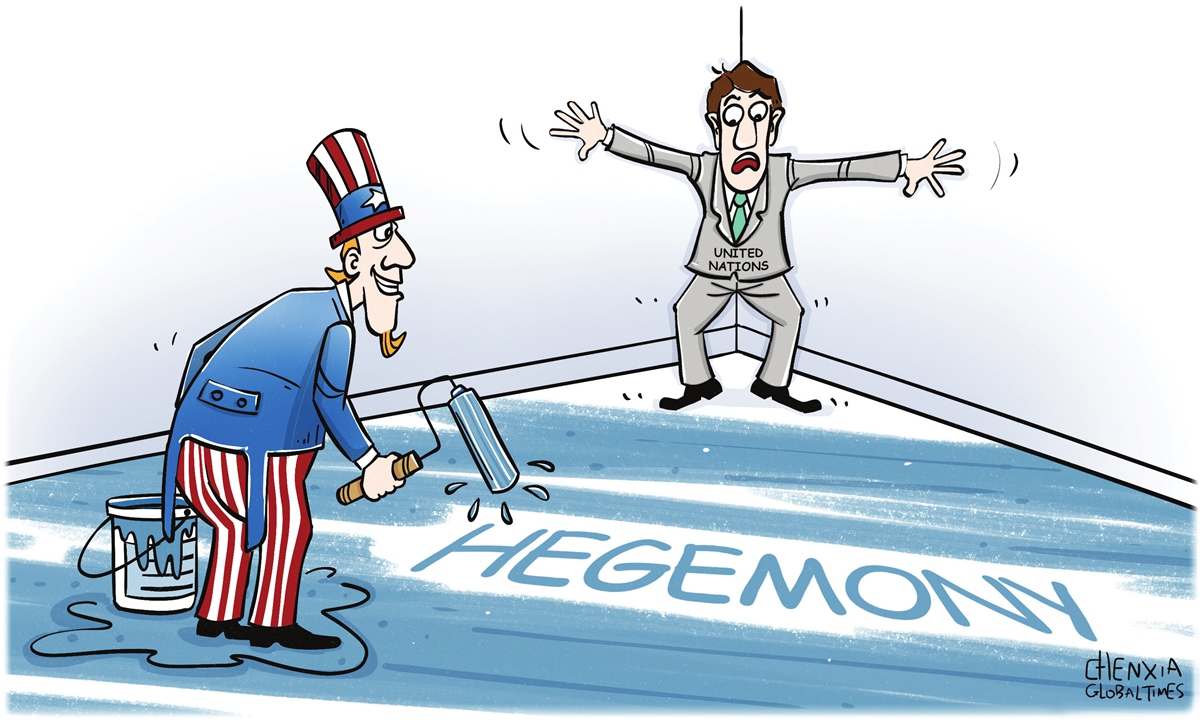
Illustration: Chen Xia/GT
As the war in Gaza drags on, a United Nations (UN) expert on Friday criticized US efforts to increase humanitarian aid to the region, such as plans to build a temporary port and recent airdrops, for being "absurd" and "cynical" methods as long as the country's military aid to Israel continues.
Not long ago, UN Secretary-General Antonio Guterres said the UN Security Council (UNSC) is increasingly "unable to act on the most significant peace and security issues of our time." He did not specifically name the US, but there was little doubt that was the country he had in mind when he made that remark.
Speaking at the opening session of the UN's Human Rights Council on February 26, Guterres laid bare his fears that continued obstructionist behavior has "perhaps fatally" undermined the UNSC at a time when protracted crises in Palestine and Ukraine require the legitimacy of the UN in order to bring about equitable and fair prospects for peace.
In acknowledging Guterres' words, the history of the US acting as a bully inside the UN must also be acknowledged. The fact is that such bullying behavior is nothing new. Kishore Mahbubani, who represented his native Singapore at the UN for over a decade, outlined the roadblocks the US often set up during his time in New York. In his 2008 book, The New Asian Hemisphere, Mahbubani wrote that each time "America felt strongly about an issue, it would force the council to accept its point of view." He added that "whenever American interests diverge from global interests, its dominance of the UNSC could create serious distortions."
Mahbubani offered the following example to demonstrate his thesis: In 2002, the US used its power to insist that no American military personnel taking part in international peacekeeping efforts could be prosecuted by the International Criminal Court. Left unstated by Mahbubani was the understanding that the US would have been outraged if one of its foes had made a similar proposition for its men and women in uniform.
Perhaps the most egregious US behavior inside the walls of the UN occurred a year later. On a fateful February day in 2003, US Secretary of State Colin Powell lied - there is no other way to state it - when he insisted that there were weapons of mass destruction (WMDs) in Iraq. His words set the stage for the US-led war in that country, a war that destroyed Iraq's civil society. It did not take long for the global audience to realize there were no WMDs in Iraq, and yet no US official was ever sanctioned by the UN for beginning what the head of the UN admitted was an illegal war. Why? Remember Muhbubani's words: "Whenever American interests diverge from global interests, its dominance of the UNSC could create serious distortions." In other words, the US would have vetoed, and therefore killed, any such attempts.
The US also undercuts the UN by refusing to pay its allocated dues. From 1995 through 2005, the US consistently owed the UN more than $1 billion annually. Former US president Donald Trump then cut hundreds of millions of dollars of UN funding during his time in the White House, leading three former US officials to demand current president Joe Biden make good on such payments, and, for the most part, he has.
Fast forward to 2024, and the UNSC has been stonewalled on three separate occasions because the US has voted against resolutions that would have demanded an immediate cease-fire in Palestine. As the US is a member of the Security Council, its "no" vote prevented the call from being enacted. US officials claimed that any cease-fire resolution would harm ongoing discussions aimed at a swap of hostages between Israel and Hamas.
That message did not sit well around the world.
China's ambassador to the UN was one of many international representatives blasting the American decision. Zhang Jun said that the US veto sends a wrong message, pushing the situation in Gaza into a more dangerous one. Zhang added that the US was "giving the green light to the continued slaughter" of innocent men, women and children at the hands of the Israelis.
Algeria's ambassador to the UN, Amar Bendjama, said, "A vote in favor of this draft resolution is support to the Palestinians' right to life. Conversely, voting against it implies an endorsement of the brutal violence and collective punishment inflicted upon them."
Suffice to say, US officials did not care what the Chinese or Algerians said. But Guterres did.
At one point, he was asked by reporters after his aforementioned speech at the human rights gathering if the UNSC might one day become basically brain dead because it could not engage successfully whenever a crisis developed around the world. Guterres said: "If the Security Council one day shows that it is incapable of doing anything, then it will be very close to this medical condition."
Should such a day ever arrive, the bitter truth would be that the US - the nation that boasts over and over again about being the global champion for human rights - would have been shown to have used its enormous power and wealth too often for its own selfish goals.
The world will not be a safer place without the UN as a prominent actor. One can hope the American officials stop creating obstacles, so that the UN is able to carry out its honorable mission.
The author is an associate professor at the Department of Communication and Organizational Leadership at Robert Morris University. opinion@globaltimes.com.cn

